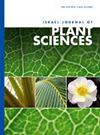甜菜根嗜酸乳杆菌与甜菜根嗜酸乳杆菌互作对甜菜根生长及生理生化变化的影响
IF 0.9
4区 生物学
Q4 PLANT SCIENCES
引用次数: 0
摘要
单独接种、接种前、接种后和同时接种南方根结线虫、倍管乳杆菌和立枯丝核菌,以了解每种病原体对生长、叶绿素和类胡萝卜素、超氧化物歧化酶(SOD)、过氧化氢酶(CAT)、过氧化物酶(POD)、抗坏血酸过氧化物酶(APX)、谷胱甘肽过氧化物酶(GPX)、还原型谷胱甘肽还原酶(GR)活性和脯氨酸的作用,H2O2和丙二醛(MDA)。用M.incognita/P.betavascorum或R.solani接种植物降低了植物生长(根干重)(42.0%)、叶绿素(24.2%)和类胡萝卜素(47.7%),而接种所研究的病原体导致抗氧化酶、脯氨酸、H2O2和MDA的活性增加。与单个病原体相比,研究中的病原体联合接种导致植物生长(74.9%)、叶绿素(55.3%)和类胡萝卜素(83.7%)的减少更大。在B.betavesarorum和R.solani接种前20天,隐翅虫的植株生长、叶绿素和类胡萝卜素的减少最大,抗氧化酶、脯氨酸、H2O2和MDA的活性最大。β维管菌和茄尼R.solani减少了没食子酸和线虫的繁殖,但当β维管杆菌和茄尼R.solani在线虫之前接种时,观察到没食子酸(82.8%)和线虫繁殖(82.7%)的最大减少。坏死软腐病和根腐病指数分别为3。当两种或两种以上病原体一起接种时,疾病指数为5。事先接种隐球菌使甜菜根易感染倍他维管菌和龙葵,并加重疾病。本文章由计算机程序翻译,如有差异,请以英文原文为准。
Effects of Meloidogyne incognita, Pectobacterium betavasculorum and Rhizoctonia solani interactions on growth, physiological and biochemical changes of beetroot
Effect of Meloidogyne incognita, Pectobacterium betavasculorum and Rhizoctonia solani alone, pre, post and simultaneous inoculations to find out role of each pathogen on growth, chlorophyll and carotenoid, superoxide dismutase (SOD), catalase (CAT), peroxidase (POD), ascorbate peroxidase (APX), glutathione peroxidase (GPX), glutathione reductase (GR) activities and proline, H2O2 and malondialdehyde (MDA) of beetroot (Beta vulgaris L). Inoculation of plants with M. incognita / P. betavasculorum or R. solani reduced plant growth (root dry weight) (42.0%), chlorophyll (24.2%) and carotenoid (47.7%) while inoculation of pathogens under study resulted in increased activities of antioxidant enzymes, proline, H2O2 and MDA. Combined inoculation of pathogens under study resulted in greater reduction of plant growth (74.9%), chlorophyll (55.3%) and carotenoid (83.7%) than individual pathogen. Greatest reduction in plant growth, chlorophyll and carotenoid and maximum activities of antioxidant enzymes, proline, H2O2 and MDA were observed when M. incognita was inoculated 20 days prior to P. betavasculorum plus R. solani. P. betavasculorum and R. solani reduced galling and nematode multiplication but maximum reduction in galling (82.8%) and nematode multiplication (82.7%) was observed when P. betavasculorum plus R. solani were inoculated prior to nematodes. Necrosis soft rot and root rot indices by P. betavasculorum and R. solani were 3 respectively. Disease indices were 5 when two or more pathogens were inoculated together. Prior inoculation of M. incognita predisposed beetroots to P. betavasculorum and R. solani and aggravates the disease.
求助全文
通过发布文献求助,成功后即可免费获取论文全文。
去求助
来源期刊

Israel Journal of Plant Sciences
生物-植物科学
CiteScore
1.90
自引率
0.00%
发文量
17
审稿时长
>12 weeks
期刊介绍:
The Israel Journal of Plant Sciences is an international journal of extensive scope that publishes special issues dealing with all aspects of plant sciences, including but not limited to: physiology, cell biology, development, botany, genetic
 求助内容:
求助内容: 应助结果提醒方式:
应助结果提醒方式:


